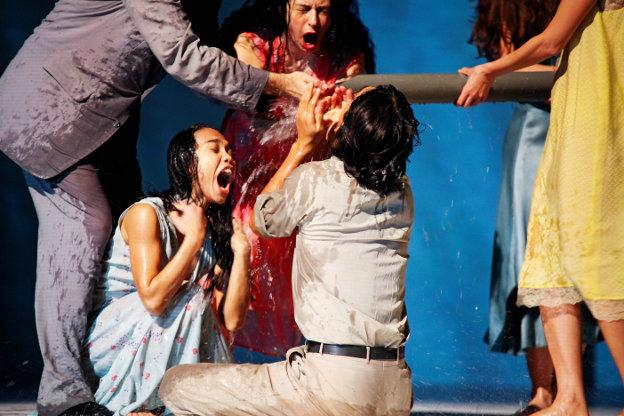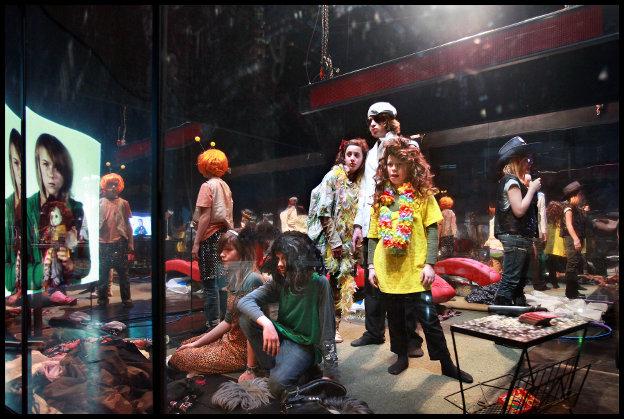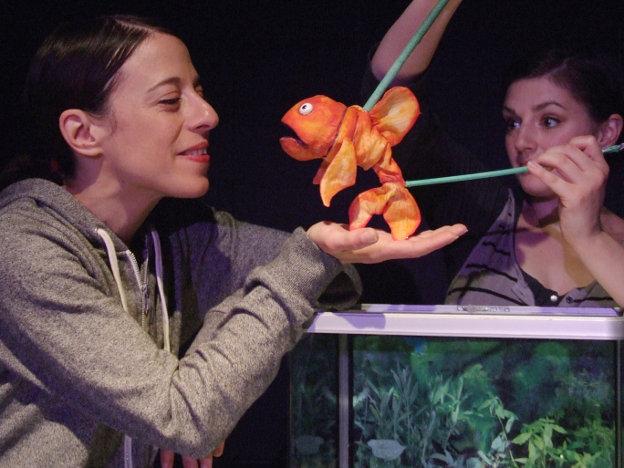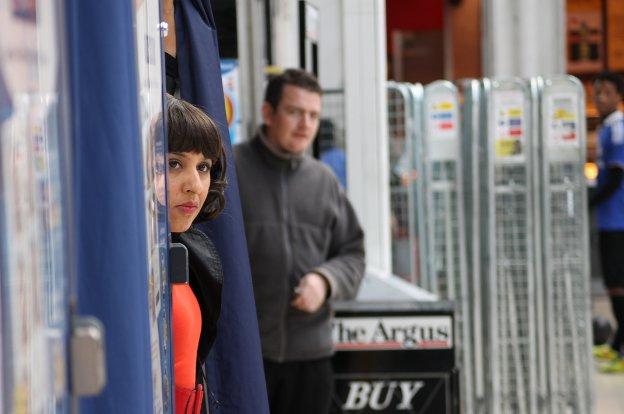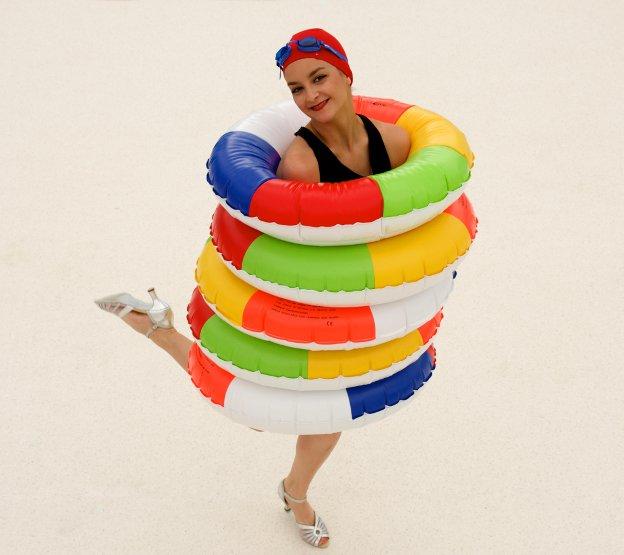
On a wet Saturday afternoon I took myself off to see Like a Fish Out of Water, a site-specific performance at Hampton Lido that blended handheld video technology with live action. The project had also taken place earlier in the week at Uxbridge Lido and was developed by Seven Sisters Group in partnership with English National Ballet as part of the London 2012 Festival project SECRETS: Hidden London.
Under a canopy at the reception point I had a choice of sun visor or umbrella, and received an iPod with headphones. Following the instructions given to me by the cheery elderly lady’s voice, I entered the lido via its side gate and walked into the story of Like a Fish Out of Water‘s fictional heroine, Sub Marina, a woman who had visited and swum in the lido since childhood. Sub Marina narrated my meanderings, explorations and observations for the next 45 minutes, a constant aural companion to my adventure. On land she is ‘like a fish out of water’; it’s only submerged in the aqua world where her fantasies swim and her inner realms literally come to life!
It took me a while to coordinate sensing when to look at the iPod screen’s video and when to look at what was physically in front of me in the real world – yet what in the real world in front of me was real? Was the lifeguard a performer? Those kids squealing on the water slide – part of the performance or everyday kids larking at the poolside? On my handheld screen I see a ‘water baby’, a joyful girl smiling up at me from her watery playground. So, tentatively setting off on my solitary stroll into Sub Marina’s memories and adventures at this lido, I realised sooner or later that all the swimmers were not performers, they were genuine all-weather swimmers! I listened to Marina’s underwater reveries of childhood encounters with mermaids, sea witches and selkies. She shared with me her teenage years, her courting days, and her motherhood – right up to the present time.
One quiet highlight occurs when I’m guided by Sub Marina’s voice into an outdoor changing cubicle, and invited to lock myself in on my own. The cubicle provides a welcome solitary moment with just the smell of the pool, yet no sight nor sound of it, and there on my iPod’s screen is Sub Marina as a young wife – underwater, wearing a housecoat and standing at an ironing board, her husband reading the newspaper, a string of babies floating up. She has lost her liberty and wants to let herself out of her domestic shackles. The film shows her twisting and turning and eventually releasing herself back into the freedom of the watery world. I left my cubicle and a little later on encountered, amongst puddles and real-world wet deckchairs, Sub Marina at the poolside, watching her kids, feeling an ache for her waterborne days.
Like a Fish Out of Water is written beautifully. It’s an evocative, characterful and spirited piece that veers away from the melancholic by the inclusion of a much appreciated touch of sauce. As a young girl Marina didn’t know what ‘No Petting’ meant, yet when she reached teenage years she realised it had nothing to do with cats and dogs and budgerigars! Sub Marina recalls the male bathers of her earlier years, all arms and legs and ‘shivery bits’. Now no one looks at her – she could dive into the water stark naked with a blue feather up her bum and no one would notice. Currently, as a mature lady of leisure, she enjoys the view from the roof of the lido – some great sights! She remembers lads ‘adjusting’ themselves down below and giving her a wink, yet if she winked back now they’d think she was suffering a stroke! She whispers to me that she looks forward to the return of the Speedo…
All in all the piece is a treat. Once I got into the rhythm of looking at the handheld iPod that aided my navigation, and once I got the hang of dividing my attention between the miniature screen and what was there for real in the immediate world, I felt transported, enchanted, and had a giggle or two! Talk about my cup of tea, this was my glass of water for sure! In the first five minutes a very toned male dancer clad in a black selkie costume, all restricted, came bounding up to me and undulated at my feet. Moments later a cocky fellow came out of the changing cubicle displaying his muscles for my attention alone, all proud of his posing pouch, right there in front of me. Later, for my solitary attention, a young fellow in his bathing trunks reclined on a blanket under a tree, wistfully lying on his back with his hands behind his head. Very three-dimensional.
It was so special being close-up to the ballet dancers, and to see how they mingled and melded with the lido activities, yet came to the forefront during the narration. Seeing them right there in the flesh, with no stage and no lights, they still appeared appropriately ‘otherworldly’ as if, during my multi-sensory expedition into Sub Marina’s thoughts and recollections, they had slipped out and taken fleshy form before my very eyes.
The seamless shifting in and out of real and fantasy worlds was aided by a spot-on soundscape that mixed with the everyday sound of people enjoying the lido, their chatterings and splashes, and with the noise of the aeroplanes passing over. The timing of everything was perfect, like it was all happening just for me. I never once felt I was standing there waiting for something to happen.
At the end, the film on my iPod showed a beautiful underwater scene of a man in a white shirt embracing a mermaid in a red dress. The film ended and, back in the real world, six shrieking kids slid gleefully into the pool on waterslides. I left feeling the same sense of delight and surprise having abandoned myself to this lusciously vivid watery imagining.

